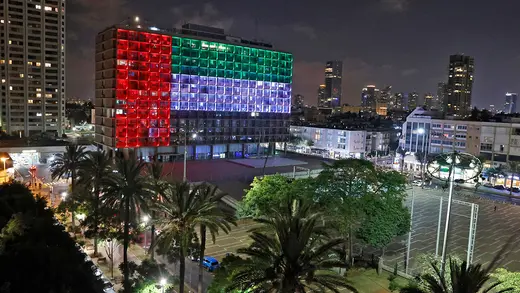
The United Arab Emirates has agreed to normalize relations with Israel, paving the way for other Arab nations to do the same but angering the Palestinians.
The agreement between Israel and the United Arab Emirates promises to establish normal relations between the two countries. These include business relations, tourism, direct flights, scientific cooperation, and, in time, full diplomatic ties at the ambassadorial level. The Emiratis are unlikely, however, to locate their embassy in Jerusalem. An important component of the Abraham Accord, though not specifically spelled out, is enhanced security cooperation against regional threats, especially from Iran and its proxies. It is important to note that Israel and the UAE reportedly already have security ties, but the agreement brings them into the open.
More From Our ExpertsAccording to the Emirati government, the accord “immediately stops” Israeli plans to annex parts of the West Bank and provides an opportunity for Israel and the Palestinians to renew negotiations to end their conflict. Israeli officials use the word “suspend.” The difference in language represents the politics that each country’s leader confronts. In the case of the UAE, Crown Prince Mohammed bin Zayed clearly felt compelled to demonstrate that normal relations with the UAE were not cost-free for the Israelis. For Israeli Prime Minister Benjamin Netanyahu, use of the term “suspend” is an effort to mollify pro-annexation political groups and factions, which have already criticized the agreement.
Israel and the UAE have been inching toward normalization in recent years. In 2015, Israel opened a diplomatic office in the Emirati capital of Abu Dhabi tied to the International Renewable Energy Agency; senior Israeli officials have visited Abu Dhabi; Israeli athletes have participated in regional competitions in the UAE; and Israel is set to participate in Dubai’s World Expo 2020, which is now scheduled to open in October 2021 due to the coronavirus pandemic.
The World This WeekSignificant momentum for an agreement began when Israel did not begin the process of annexing West Bank territory on July 1 as Netanyahu had indicated. The Emiratis reportedly took the opportunity to promise full normalization of relations if annexation was taken off the table. This was the subtext of an op-ed that the Emirati ambassador to the United Sates published in Israel’s largest daily newspaper, Yedioth Ahronoth, in June. Sympathizing with the strong Israeli desire to widen the country’s formal diplomatic relations with Arab nations in the Persian Gulf and seizing upon the Emirati signaling, the Donald J. Trump administration oversaw the three-way diplomacy that resulted in the Abraham Accord.
Despite the apparent Israeli promise of halting annexation, the Palestinian leadership rejected the accord and recalled its ambassador from Abu Dhabi. From the perspective of the Palestinians and their supporters, the agreement reflects bad faith on the part of Israel, the UAE, and the United States, since the Israelis and Emiratis had been normalizing ties even before the Abraham Accord.
More From Our ExpertsThis criticism is not unwarranted. Israel has demonstrated little interest in negotiations with the Palestinians as it has tightened its grip on the West Bank and, along with Egypt, maintains a tight cordon around the Gaza Strip. The Trump administration has moved the U.S. embassy from Tel Aviv to Jerusalem, ended or significantly curtailed aid to Palestinians, and produced a peace plan that Palestinians regard as grossly unfair to their national aspirations and rights. At the same time, leaders in Ramallah regard the ongoing normalization of ties between Israel and the UAE as an indication that Abu Dhabi has betrayed the Palestinian cause. For their part, the Emiratis do not want to subordinate their national interests to an ineffectual and corrupt Palestinian leadership. All of this suggests that, in the short run, any expectation of new negotiations between Israel and the Palestinian Authority is misplaced.

Within the region, Bahrain, Egypt, Jordan, and Oman publicly welcomed the Abraham Accord. Saudi Arabia has remained silent, though there is significant speculation among analysts that this nonreaction is a sign that Crown Prince Mohammed bin Salman supports the agreement but is constrained because his father, the king, opposes normalization with Israel. Iran, Qatar, and Turkey have all criticized the accord, with the latter threatening to withdraw its ambassador from Abu Dhabi. Civil society organizations throughout the region remain steadfast in their opposition to normalizing relations with Israel. These include groups in the Gulf, which have spoken out specifically against the Israeli-Emirati agreement.
Among countries in the Gulf, Bahrain is most likely to follow the UAE. King Hamad has overseen steps toward normalization, including allowing Israeli officials to attend a regional security meeting in the country. Additionally, the Israeli foreign minister has met with his Bahraini counterpart and that official’s predecessor.
Oman is another possible candidate for normalization. Netanyahu met with the late Sultan Qaboos bin Said in Muscat in late 2018. However, Sultan Haitham bin Tariq, who came to power in January 2020, could act more cautiously regarding relations with Israel as he consolidates his power.
Morocco and Sudan might also seek to establish diplomatic relations with Israel.